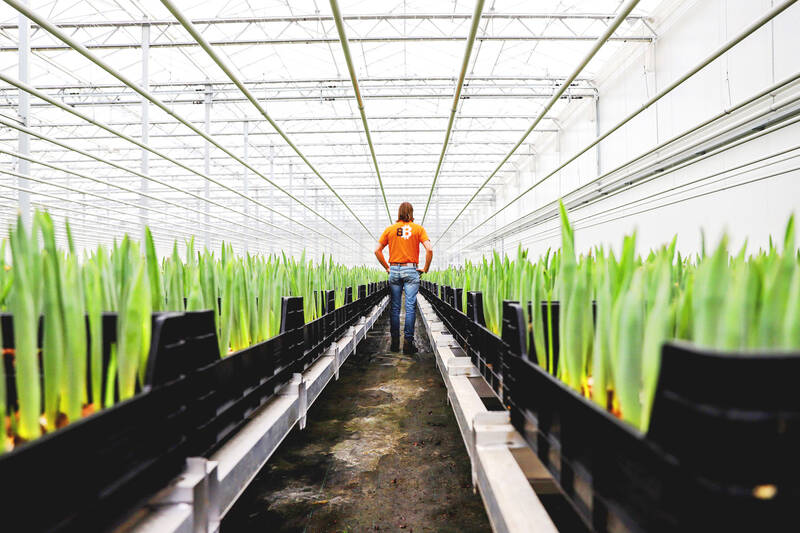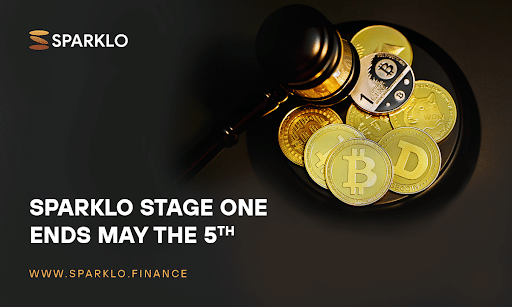Dutch farm uses bitcoin mining to grow tulips

‘WIN-WIN SITUATION’:
A company that mines bitcoins uses the heat generated by its computers to heat a greenhouse, helping to cut down on natural gas costs
Tulips and bitcoin have both been associated with financial bubbles in their time, but in a giant greenhouse near Amsterdam, the Dutch are trying to make them work together.
Engineer Bert de Groot inspected the six bitcoin miners as they performed complex sums to earn cryptocurrency, filling the air with a noisy whine along with a jolt of heat.
That heat warmed the greenhouse where rows of tulips grow, reducing farmers’ dependence on gas whose price has risen since Russia’s invasion of Ukraine.

Photo: AFP
The servers, in turn, are powered by solar energy from the roof, reducing the normally huge electricity costs of mining and reducing the impact on the environment.
Meanwhile, both the farmers and De Groot’s company, Bitcoin Brabant, earn cryptocurrency, which continues to attract investors, despite a recent crash in the market.
“We think that with this way of heating the greenhouse, but also with earning some bitcoin, we have a win-win situation,” flower farmer Danielle Koning, 37, told reporters.
The Netherlands’ love of tulips caused the first stock market crash in the 17th century when speculative bulb prices sent prices soaring, only to later collapse.
Now the Netherlands is the world’s largest tulip producer and also the second largest agricultural exporter overall after the United States, with much grown in greenhouses.
However, the low-lying country is well aware of the effect of the agricultural industry on climate change, while farmers struggle with high energy prices.
Meanwhile, cryptocurrency mining requires huge amounts of electricity to power computers, leading to an environmental impact amid global efforts to tackle climate change.
De Groot, 35, who first started his business earlier this year and has 17 clients, including restaurants and department stores, said this makes bitcoin and tulips a perfect fit.
“This operation is actually carbon negative, and so are all the operations I’m basically building,” said the long-haired de Groot, wearing an orange polo shirt with the company’s logo. “We’re actually improving the environment.”
He also sells tulips online for bitcoin via a business called Bitcoinbloem.
The collaboration started when Koning saw a Twitter video De Groot had made about bitcoin mining and called him up.
Now there are six servers at their greenhouse, the exact locations of which Koning asked to keep secret to avoid thieves targeting the 15,000-euro (US$15,812) machines.
Koning’s company owns half of them and keeps the bitcoin they produce, while De Groot gets to keep his three servers there in exchange for monthly visits to clean dust and bugs out of the servers’ fans.
With a difference of 20°C between the air entering and leaving the machine, this provides the heat needed to grow the tulips and dry the bulbs that produce them.
“The main thing we get out of it is that we save on natural gas,” Koning said. “Secondly, well, we earn bitcoin by running them in the greenhouse.”
Huge energy costs have driven some Dutch agricultural businesses that often rely on greenhouses to stop growing this year, while others have even gone bankrupt, Koning said.
Meanwhile, philosopher Nassim Nicholas Taleb, who developed the idea of the unpredictable but historic “black swan” event, has compared bitcoin to the “Tulipmania” that engulfed the Netherlands nearly 400 years ago.
This caused prices for a single bulb to rise to more than 100 times the average annual income at the time before the bubble burst in 1637, causing banks to fail and people to lose their savings.
The cryptocurrency sector is reeling from the collapse of a major exchange – with bitcoin worth about $17,170 per unit, down from a peak of $68,000 last November – but De Groot isn’t worried.
“I have absolutely no concerns about the long-term value proposition of an immutable monetary system,” he said. “Bitcoin will last forever.”
Comments will be moderated. Keep comments relevant to the article. Comments containing offensive and obscene language, personal attacks of any kind or advertising will be removed and the user banned. The final decision will be at the discretion of the Taipei Times.
























